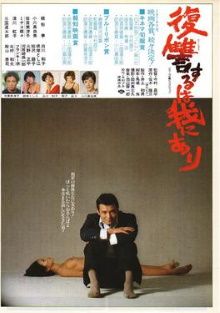One of my favorite sources of interesting films to watch these days are recommendations by the economist Scott Sumner on his blog and here is one of his picks. It’s a little hard to see the point of this at first as it’s about a guy who just commits murders seemingly at random. But immediately one suspects that this is based on a real event, so haphazard and pointless are his crimes, and this is indeed the case. Sumner even comments that these look like real murders and not movie ones. By the end, I’m convinced that this is an underappreciated masterpiece and one of the darkest films about Japanese society I have ever seen.
Iwao Enokizu is arrested for multiple murders and the details of his life and crimes are recounted through a series of flashbacks. His murder spree begins with violently killing two truck drivers he apparently knows from being a driver himself, stealing their money and running away. Earlier flashbacks reveal how his Christian family was victimized by the Japanese authorities during the Second World War and his violent response to the bullying even as a child. He grows up to be a troublesome youth and his parents try to get him settled by marrying a wife. He rejects his parents’ matchmaking efforts, marries Kazuko, a woman of his choice and has two children with her. But soon after that, he is imprisoned for fraud. While he is away, Kazuko grows close to and apparently falls in love with Iwao’s father, Shizuo. Anyway, shortly after his first murder once out of prison, he impersonates a university professor and gets close to a middle-aged woman who runs an inn. That is still only the start of a whole series of crimes that makes him Japan’s most wanted man.
This is a longer than average film and it jumps around in time a fair bit so it does take some effort to understand. Even after you get up to speed, it’s hard to make out the point of the film as Iwao commits crimes for no coherent reason and never explains himself. We are invited to speculate and form our own theories. Is he motivated perhaps by Japan’s prejudice against Christians? Yet he isn’t much of a practicing Christian himself. Is he just in it for the money? Yet he barely makes any effort to conceal his tracks or to lay low. The small amounts of money he is able to steal seems incommensurate with the severity of his crimes. Is he perhaps a classic serial killer who simply enjoys killing? He doesn’t seem to have planned his crimes out very thoroughly and while he is a skilled liar, his actions seem to have a spontaneous, opportunistic quality to me. It’s impossible to neatly fit Iwao into any category and that is part of why this feels like real-life as how can we ever truly know what is inside the mind of a real-life murderer? To me, Iwao feels like the proverbial scorpion, cunning at times but ultimately short-sighted and unable to resist his murderous impulses even when it is against his own interests. Yet that too is just one possible reading of his mindset.
Finally what makes this film truly stand out is that far from presenting Iwao as a monstrously incomprehensible serial murderer in a world of ordinary people, he is merely used to represent the furthest extreme in a world of similarly fucked up people. In addition to the powerful sexual attraction his father and his wife have for each other, there is the woman Haru who runs an inn and lives with her mother, Hisano. Iwao learns that Hisano was a murderess herself but has completed her sentence in prison. Meanwhile Haru is trapped in an abusive relationship with a man who holds the lease to her inn. When Haru discovers that Iwao is a fraud and a massive manhunt is underway for him, she doesn’t turn him to the police. If anything, she becomes even more attracted to him and sees in him a kind of escape from a meaningless life. On some level, surely she realizes that her fantasies of running away with him are unrealistic and continuing to stay on with him will only end with her own death, yet she does so anyway. Taken together with its implication that this the darkness that lies underneath the veneer of Japanese civility, this is one of the most nihilistic views of Japan I’ve ever seen.
This is the first film we’ve watched from director Shōhei Imamura and it seems like he is part of what is called the Japanese New Wave. From I read his work focuses on the dark side of Japanese society which instantly makes me interested in watching more of it. For this film in particular, it would have been so straightforward to go the conventional route and make a standard biography of a real-life serial killer. Instead Imanura chose to make it from his unique perspective and that’s why this has become a part of cinematic history.

One thought on “Vengeance is Mine (1979)”